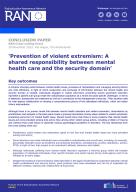Details
- Publication date
- 30 January 2024
- Author
- Directorate-General for Migration and Home Affairs
- Country
- Netherlands
- RAN Publications Topic
- Multi-agency cooperation
Description
A complex interplay exists between mental health issues, processes of radicalisation and managing security factors and risks efficiently, in light of which cooperation and exchange of information between the mental health and security domain is needed. Individuals engaged in violent extremism presenting severe psychiatric disorders represent a specific sub-group inside the radicalisation population as a whole and pose specific challenges in terms of detection, assessment and treatment as well as in connection to the management of security. Their situation calls for inter-agency collaboration to develop a comprehensive picture of the radicalised individuals, which can better inform interventions.
Although there is no proven causal link between mental health disorders and violent extremism, observations by practitioners and analysts in the past years reveal a growing intersection among cases related to violent extremism presenting some form of mental health issue. Recent trends show that there is some evidence that mental health issues are more prevalent among lone actors than among other violent group actors, including a history of trauma and violence that could induce or generate various psychological problems or disorders.
The key takeaways from the cross-cutting event are:
- Practitioners, policy-makers and researchers agree on the fact that mental health issues are more prevalent among lone actors;
- Some disorders may make individuals more vulnerable to radicalisation and recruitment, including, for example, personality disorders (such as borderline and antisocial disorders), schizophrenia, anxiety, depression, autism, PTSD, in light of their high impact on an individual’s attitude, behaviour and beliefs;
- Although individuals suffering from mental health disorders represent a minority group within the broader population of radicalised individuals, their specific situation and needs require strong multi-agency work to be initiated at an early stage;
- Despite the existence of several factors (described later in the paper) hindering the cooperation between mental health professionals and security actors, good practices have been developed and can be of inspiration for different contexts, starting with collaboration at local level;
- The detection and monitoring of individuals at risk of radicalisation and suffering from mental health issues are further complicated by the latest changes in the radicalisation processes (blurred ideological frameworks) as well as by the impact of the online dimension in radicalisation and recruitment.
This paper summarises the main takeaways of the discussion held during the RAN cross-cutting event on ‘Prevention of violent extremism: A shared responsibility between mental health care and the security domain’. It starts with an analysis of the nexus between mental health issues and violent extremism, scrutinise its complexity as well as the latest trends, an overview of main challenges hindering the cooperation, followed by a list of recommendations and some follow-up topics. The paper ends with a presentation of some inspiring practices.

